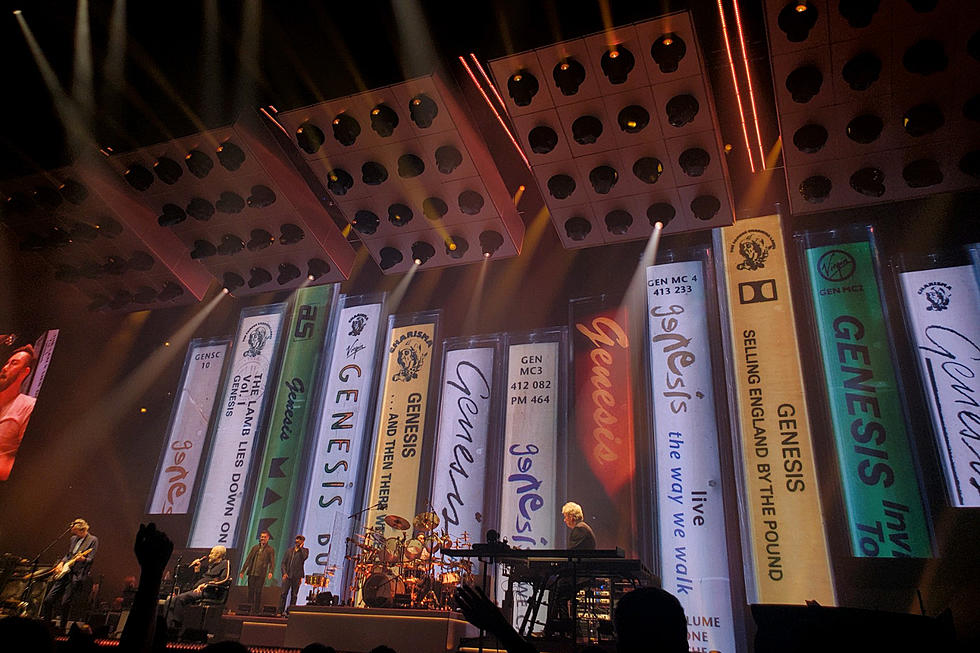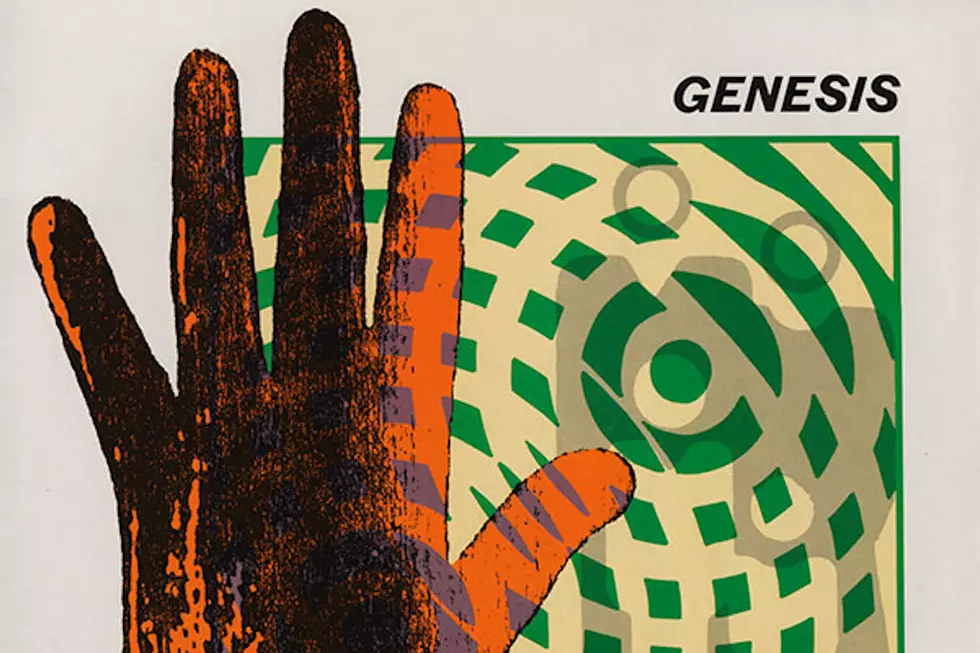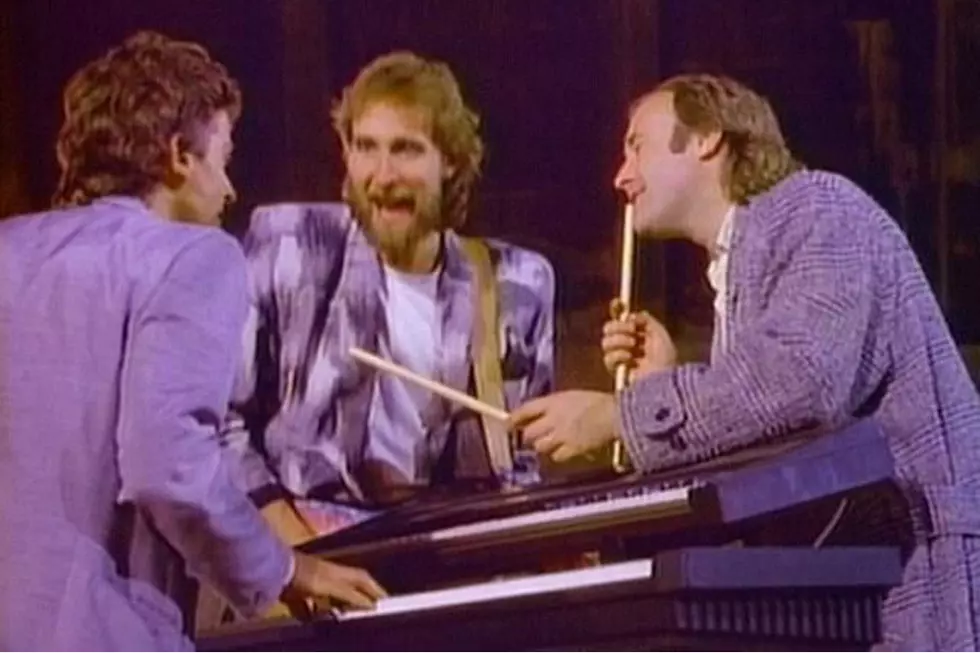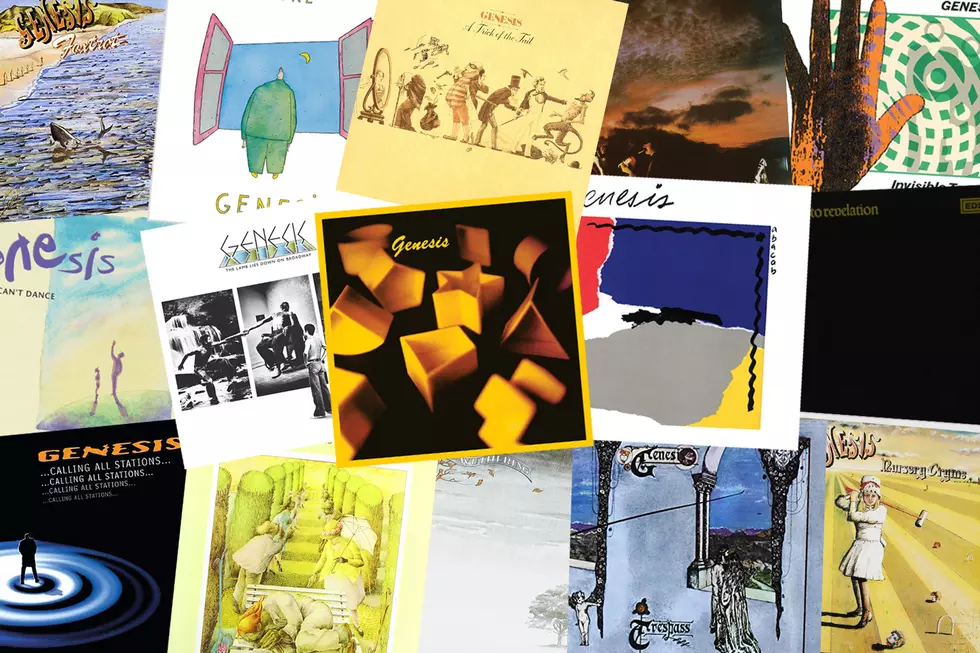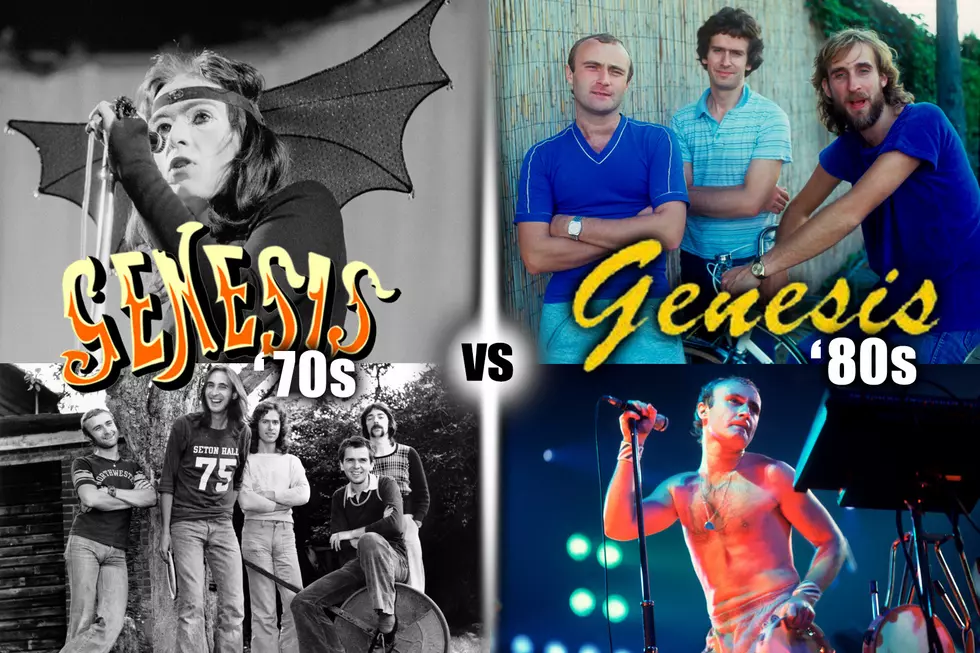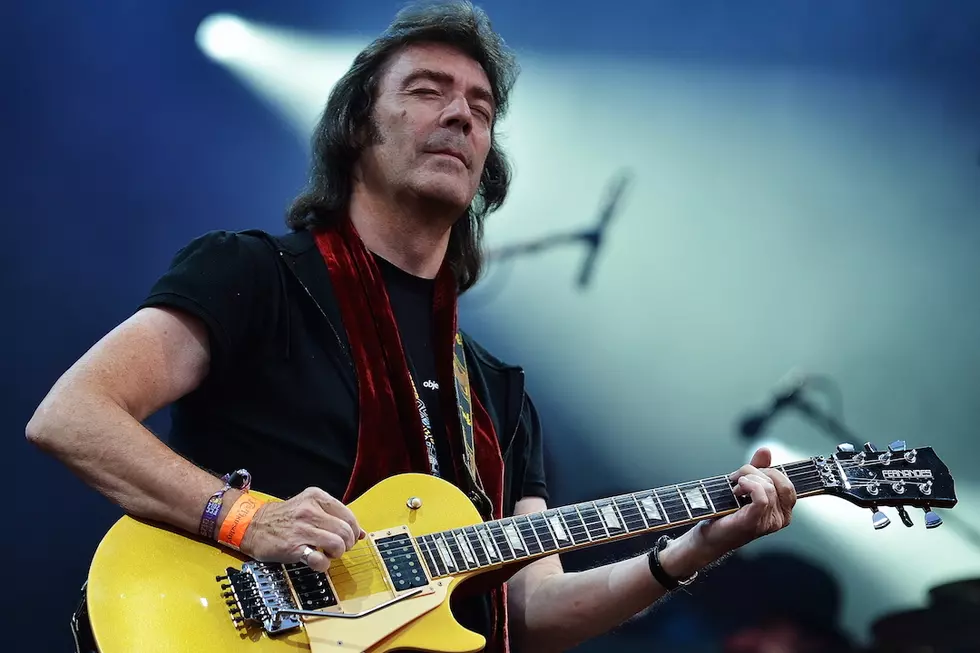
Steve Hackett Celebrates Genesis: ‘I Do Love the Music’
Steve Hackett's hard drive, much like his brain, is crammed with music. In conversation, he fluidly, and almost stream-of-consciously, shifts from topic to topic. At one point, his focus darts from the prog-rock legacy of his former band, Genesis, to "MacArthur Park" writer Jimmy Webb to British composer Edward Elgar to the Beatles, all before circling back again.
When he hops on the phone just days before Christmas, he isn't even sure which project to talk about: an in-progress studio album, a handful of collaborations and one-off recordings, upcoming live DVD Wuthering Nights (which launches Jan. 18 with a, ahem, cinema show in London) or his latest Genesis Revisited tour, which kicks off with Yes' fifth-annual prog-rock voyage, Cruise to the Edge. So he discusses them all – often in the midst of a single sentence.
Tell me more about your progress on the new studio album.
I'm actually building a new studio on another floor on the house I'm living in. The idea is that once that's built, I'll do the other half. I always think it's good to have a project in-hand so that I've got as much recorded as possible. That way, if it takes not the six weeks that people are saying it's going to but six months, since that's the way builders work, I've got stuff in-hand already.
Your last studio album, The Night Siren, was defined by its cultural scope. You worked with musicians from all over the world, including the Middle East, and incorporated a lot of instruments you don't often hear in a rock context. What's your mindset with the new album?
I'll tell you where my heads at. It takes computer sketches, first at all, then we add humans as it goes along. In other words, we get a template and create a space for people to work – as opposed to the old days where you sat in rehearsal rooms and said to people, "The song goes like this." It doesn't work like that anymore. What we have is absolute reference points with click tracks and as much of the framework as we can fill in. For instance, we had a sitar player come in. The song is by no means complete, but we were able to record the areas where I wanted the sitar. Things are in a constant state of flux and update. That's how it works for me. I also re-recorded "When the Heart Rules the Mind" by GTR [Hackett's short-lived mid-'80s project with Yes' Steve Howe], and it's turned out very well. I always wanted to do my own take on it and use the technology of now to give it a new slant. But it's very much the song. We used about 300 tracks on it, but you'd never know that. I'm very pleased with that, and Steve Howe seems very pleased I'm going to be playing that stuff live again and seemed interested that I was doing a re-record of it. A while back, I gave him the rights to include the original on an album of his. I think we wish each other well on this stuff that goes on.
Anything else in the works?
Funny enough, I've been talking to the Genesis office about The Lamb Lies Down on Broadway, which people were hoping to be able to download single tracks from. We've all just given our blessing to that – now you don't have to listen to the whole thing. You can just go to your favorite track, whether it's "The Carpet Crawlers" or "Back in N.Y.C." In the spirit of goodwill and just saying "green lights all around," it's very good that we all came to an agreement very quickly.
Speaking of GTR, I've always thought that album never deserved quite the harsh criticism it's received over the years. There are some strong songs on there, but the dated production brings the material down a bit. I'm pleased to hear you re-recorded "When the Heart" – I've always been curious to hear what a modernized version would sound like.
I do agree with you. For a long time, I've wanted to do my own take on that and make it sound as full as possible – and not quite as piercing perhaps. Something which sounds like a good stereo mix as opposed to an '80s, radio-friendly mix. There's no point in making things overly bright. This sounds really good, really killer.
Are you planning to include that on the next solo album?
It's funny – we've been talking about [including it on] my second retrospective career box set. We did an early one called Premonitions, which kicked off [chronologically] during my Genesis time. Now there's a mid-point one. But I think "When the Heart" came out so strongly that it should probably come out on my next studio album. My feeling is that I might just hold back on that a little bit. I was also in the process of doing some bonus tracks for the Japanese version of Wuthering Nights, and I did a track and thought it was so good that I thought again, "This is so good, it should go on the next studio album," so I did some other tracks for them. Sometimes you do some tracks for one thing and you end up playing around with [the placement] a little bit. Very often it's good not to be thinking about your mainstream, new-album ideas but the ideas you might do around it. Sometimes people will say, "Can you do this or that?" and it turns out very strong. I took part in a tribute to Jack Bruce with his son, Malcom Bruce, and we did a version of "Spoonful" that sounded absolutely dynamite, killer. I've always loved that, but whether or not that has any place in a progressive artist's catalog, I don't know. At one time, that was it – you did a mixture of other people's tunes and your own. The early '60s blues boom was based on that. I think the blues boom died on a lot of us, but I was a great blues fan – I loved Paul Butterfield and his band, the Mike Bloomfield era, East-West, all of that. Of course, I was a harmonica player long before I was a guitarist. It's funny people are just now discovering the one blues album I did way back, [1994's] Blues With a Feeling. Roger Dean was just saying to me, "Why don't you do a rockabilly album?" We look at that stuff in context: What thrills me might be in direct contradiction with what might thrill a progressive audience, who would probably prefer you to just keep doing Genesis covers. Live, of course, 50 percent of the show I do is Genesis. Sometimes it's 60/40, one way or the other. And as much as I love celebrating the past, I like to do new stuff as well.
When you start doing these Genesis Revisited tours, it seemed to be a big career boost. On the other hand, I'd assume there's this assumption now that you have to play the Genesis stuff onstage. Do you still feel excited to play this stuff, or do you sometimes wish you could just focus on your solo material?
I did many shows where I did nothing but solo material, so you reach a point in life where you think, "Well, why the hell not?" If you're part of a band that had international success, and if you're still proud of the work, which I am. … I feel as though there's actually no distinction between solo work and Genesis work. The approach we had with early Genesis – if we could have voiced it at the time, I suppose we would have said it was "pan-genre," in order to be able to accommodate the different tastes that accompanied the band. I just finished reading Jimmy Webb's autobiography, and what I hadn't realized is that back in the day, when we were interviewed by the all-powerful English paper at the time, Melody Maker, we were asked what our favorite hit single was at the time, and four out of the five of us, without conferring, all chose "MacArthur Park." You start to see the seeds of the way Genesis developed with that: the idea of songs that were longer, it wasn't just verse-chorus. You have the seeds of the whole progressive movement starting right there. Whether it was that or Edward Elgar being critiqued by Richard Strauss, who said in the early 1900s that Elgar's work was very "progressive." The term came up then. Elgar is most famous for "The Land of Hope and Glory," an English tune that's practically as second national anthem, which, of course, Genesis used. We used it during "Dancing With the National Knight," which has an Elgar-ian quality to it. Somewhere along the way, it's Jimmy Webb, it's the Beatles. Jimmy Web was hired to do that song, and a number of people turned it down before it was recorded by Richard Harris. It often turns out that yesterday's rejection ends up being tomorrow's hit.
Jumping to Cruise to the Edge for a second. Since Steve Howe will obviously be on board, it seems like a no-brainer that you and Steve Howe would play "When the Heart Rules the Mind" together onstage.
There's every chance, and I haven't spoken to Steve Howe about it yet, but it's an obvious one. Who knows how that will all pan out?
What's your approach for the cruise? You appear to be booked as Steve Hackett, without the "Genesis Revisited" tag that you've used in recent years. It's seems obvious you'll do at least some Genesis stuff, but are you planning to focus even more on your solo material?
I can't remember exactly how the advertising goes, but in many places we're advertising a mixture of Genesis and GTR and my stuff. So it's only one GTR tune, but as far as I know, it's all of those things. It all depends on which ad you're looking at. I think it's a given I'll do a certain amount of Genesis things, and I'm very happy with that. I don't feel any sense of compromise with that, and I'm very happy to do it. I feel the legacy of that speaks for itself. Let's put it this way: When John Lennon said in 1973 that Genesis was one of the bands he was listening to, that was a very proud moment for me. I know Peter Gabriel felt the same way. I think if that era of Genesis was good enough for a Beatle, it's certainly good enough for me. I feel very pleased about that. I never got to meet John Lennon, but I have gotten to speak to Paul McCartney. We have enormous respect for the doors they opened up. A lot of British bands owe something to those guys.
What did you and McCartney talk about? I'm assuming he was at least aware of the Genesis stuff, but did you get the sense that he was a fan?
Yes, he was aware of the Genesis stuff. And I think at one point, he invited Phil [Collins] to join – I don't know if it was Wings that he wanted, but he wanted Phil to drum with him. He was familiar with the Genesis canon.
I know the Beatles remain a huge influence on you, particularly Sgt. Pepper's Lonely Hearts Club Band.
There's not a day that goes past where I'm not thinking about the true significance of Sgt. Pepper's. It really holds up a mirror to the British at that time. But of course Britain was starting to change. With George Harrison's influence and under the baton of George Martin, India was invited in, so suddenly it was cool and hip for the mainstream to suddenly switch and accommodate what we now know as "world music." There was an expansionist philosophy at that time, and the whole emphasis became different. The Beatles had the world's ears, and they had sufficient room to be able to do that. But by no means were they certain the world was ready for Sgt. Pepper's at that time. The interviews they'd given showed a certain trepidation – they wondered if they'd gone too far. But that element of risk was all-important. They didn't just use their position to do something comfortable – they did something new. I think that's why we all have the respect that we do for that era we think of as "psychedelic." It's a very globalized thinking that came with all that, and the album was much stronger for all of that. It's a film for the ear, with so much surprise and great character portraits, mainly from British life.
You're the only former Genesis member who – barring a few exceptions – has performed any of the band's music after leaving the band. You can tell the other members are proud of certain albums or individual songs, but you seem to really love the classic '70s stuff in a way they don't.
I do love this music – I do. It's great music. I think it's very often the case that the audience is the true owner. It's the audience that loves this stuff. The perpetrators have perhaps to love it to the degree that audiences do. But I feel I'm able to sit back – both as an observer and a participant – and say, "There's something in that music that drew many people, including one of the greatest songwriters of my generation, and I'm very proud of that." When Lennon liked us, that was at a time when we could only get one or two shows on the East coast before going directly to the west coast because there was nothing available to us in between. These days, if Lennon had given that interview to WNEW, you would tweet that straight-away, and it would cycle. "Who is this band that Lennon likes?" But it didn't work at that speed in those days. Communication was much slower. Now it's instant. Now if someone tweets something as Earth-shattering as that, everyone knows. I think I've returned to the same place, but I don't think [the other former Genesis members] have quite made that return yet. I think there's this deniability – "We did that when we were young before we learned to write hit after hit." Gabriel was doing a nod to "Dancing With the Moonlit Knight" during his [2016] shows with Sting. I'm going to do that during my shows because it's my favorite Genesis tune. I'm also going to do "Supper's Ready" because so many people have asked for that and also Roine Stolt's favorite, "Fountain of Salmacis." It doesn't matter how early it is. If it's classic, it's classic.
I was at the first Gabriel and Sting show when they played "Dancing With the Moonlit Knight." I think most of the Genesis fans there were in shock because he hadn't played any of that stuff live since early in his solo career. Why do you think it took him so long to embrace it?
Some songs stand the test of time, and only now there's that feeling of, "Oh, wow. Those two guys have done it. And, oh wow, Lennon liked it." And things start to take on a different stature. Whereas at the time, a young band is just hoping to have their contract renewed by their record company. And decades later, it seems unthinkable that the Sword of Damocles is hanging over your future the way it is for a young band today if they don't have a hit single: "You had a record deal, but now it's gone." It was a different time, and bands were allowed to grow. Differences were celebrated, and the tail was not wagging the dog. Music going its own sweet way is the best test of any long-term commercial value of something. I know a lot of times I've spoken to very, very successful musicians who say, "I'd love to do this, but my record company wants me to do that." I want to do "x"; they want me to do "y," and it comes out as "z" in the end. I think not compromising is the way to go. I'm thinking of Brian May, my pal, with whom I've worked on a couple projects. He said the record company in America wanted to release an edited version of "Bohemian Rhapsody" [as a single], and they said, "No. Either it goes out in its entirety or not at all." Again, it's the element of risk. Without the element of risk, you wont create milestones; you won't do things that are seminal. It has to have the heroic act of potential sacrifice, and it might be your career on the line. Of course, "Bohemian Rhapsody" is a great tune, and Queen were and are a great band of strong individuals. Some of this survives – it filters to the top.
Unlike a lot of artists from the original classic progressive rock era, you seem to stay at least somewhat informed on the newer generation of prog. On the Genesis Revisited II album, you worked with artists like Steven Wilson, Simon Collins and Mikael Åkerfeldt, all of whom were influenced by your work. Which brings me back to the cruise, which is fairly evenly split between classic artists and newer prog bands like Haken and Anathema. Do you ever end up checking out any of these younger artists on the ship?
To be honest, I'll be looking forward to checking out new people. It's always very interesting. I'm forever turning around and seeing the face of someone I've worked with or being reminded of that. I've wanted to give the green light to so many things because I feel that, at this point in time, whatever I do is an encore. That's the way it goes. It's not as if you make huge strides forward commercially – my songs, whether they are group things or so-called "solo things," have proved themselves. Of course, even with solo things, it's just a different team. It's always a team that makes a record – no one ever really operates truly "solo." Whatever the brand is, there'll be a bunch of guys operating under the spotlight or behind he scenes to create something. But I've been very lucky in music. Music has been very good to me. One or two older guys I've looked up to were very encouraging to me and became pals. Sometimes it's wonderful to shake hands with someone who you've admired and they hold your hand for a very long time. That can be wonderful. That happened with Richie Havens and Greg Lake. They're both gone now, but I know in spirit there's a strong bond [that carries on].
In the past couple years we've lost so many prog legends – including Lake, Keith Emerson, Chris Squire, John Wetton.
It's been an extraordinary time for the reaper. Those four guys we're talking about there … Keith Emerson and I were going to form a band with Jack Bruce and Simon Phillips. Of course, two of those guys have passed on now, but what talent, what drive. Irreplaceable. I have enormous respect and love for their work.
That's one hell of an aborted supergroup. When was this?
It was the early '80s, before Keith reformed ELP with Cozy Powell. We had a band there for about five minutes, and it all seemed like it might be very good, but I think Keith and Jack had their differences, and afterwards Keith said to me, "Well, Jack's gone now, but how would you feel about being the singer?" I said, "Whoa, in no way do I consider myself to be in Jack's league as a singer." Things were bandied around, and it looked like it might be good, but I was involved in solo work and GTR was about to be formed. You can't do everything in life, but there's always a "What if?" factor.
Did you ever record any rehearsals or demos or anything? I'm sure people would love to hear that stuff.
There were some demos of things, but I think they were at a point where they didn't have lyrics or what have you. But that stuff does indeed exist. It was a lot of work-in-progress, "Where do you take that next" [stuff]. That's a particular baton I could be running with, but I haven't so far. It's what you prioritize in life, isn't it?
It's like you were a member of this exclusive progressive rock club. Everyone was in a band with everyone at some point.
It's interesting, all of that. Lots of things were talked about. I enjoyed working with Chris Squire too. I was on some of his stuff, and he was some of my stuff. Chris asked me to join Yes at one point. I had hoped to work with Greg as well. I worked with Ian MacDonald on some things. There was a fair amount of cross-collateralization with Yes and the King Crimson guys. We all mixed it up all quite a lot. John and I were going to do something with Rick Wakeman and Carl Palmer. Whenever anyone asks me to form a band, I say, Don't ask me to form a band! Record together, yes, but don't mention the word band! It's too much of a commitment for anyone. And if anyone likes it, then maybe you've got a band. [Marillion guitarist] Steve Rothery and I have been doing some stuff, and who knows what will happen there. I've been working with an Indian sitar player too. There are lots of ideas in the pipeline.
It's almost like half that club will be on the cruise this year, including a few people who haven't been onboard before – like original Yes keyboardist Tony Kaye and former King Crimson member David Cross.
I believe [David and I] shook hands very briefly, but I don't think we had any long conversations. I think all these bands are connected really. We're all in the same band really, and we'll all in the same boat, of course. That's a terrible joke I keep making.
Genesis Albums Ranked
More From KLUB Tejano 106.9
